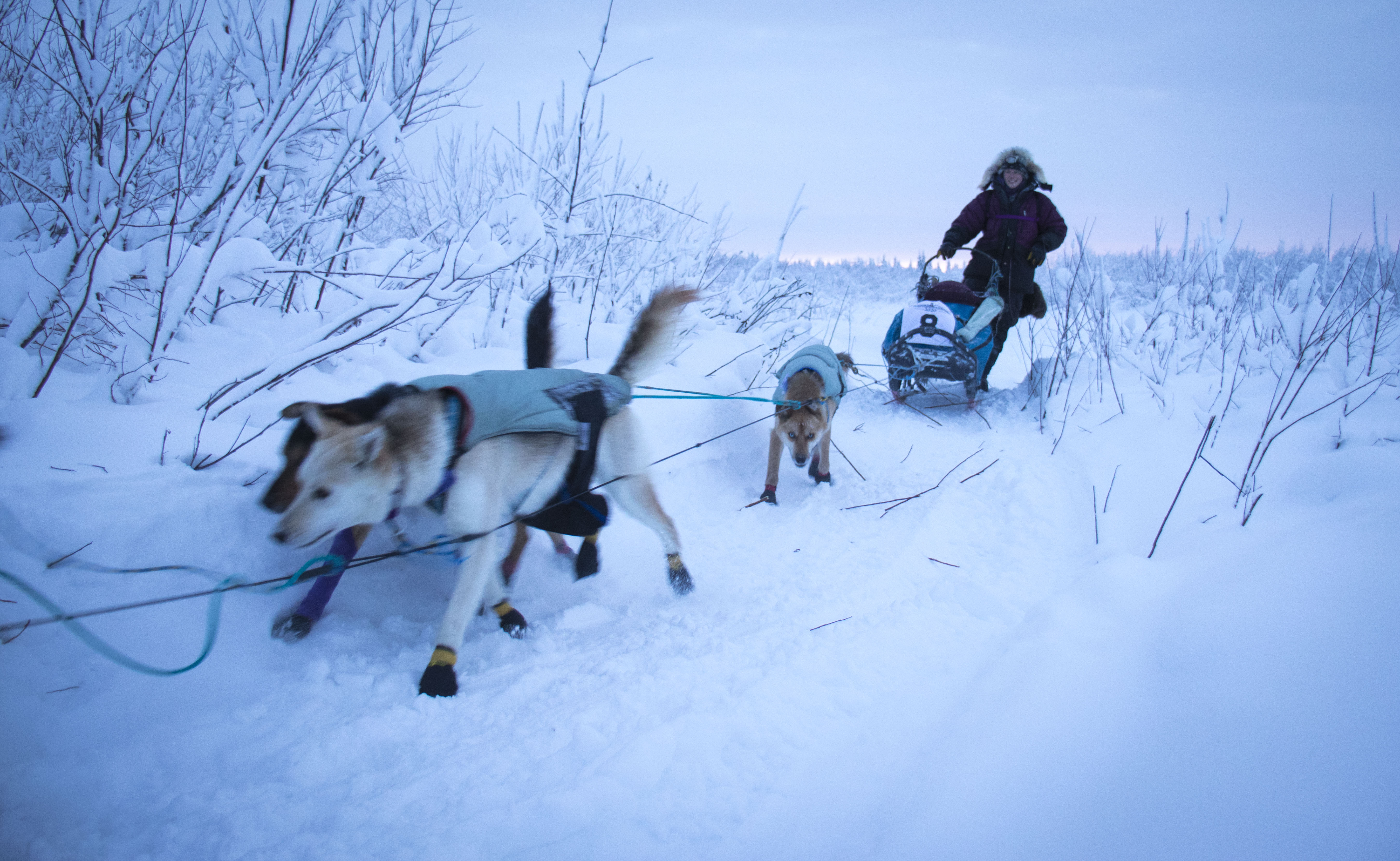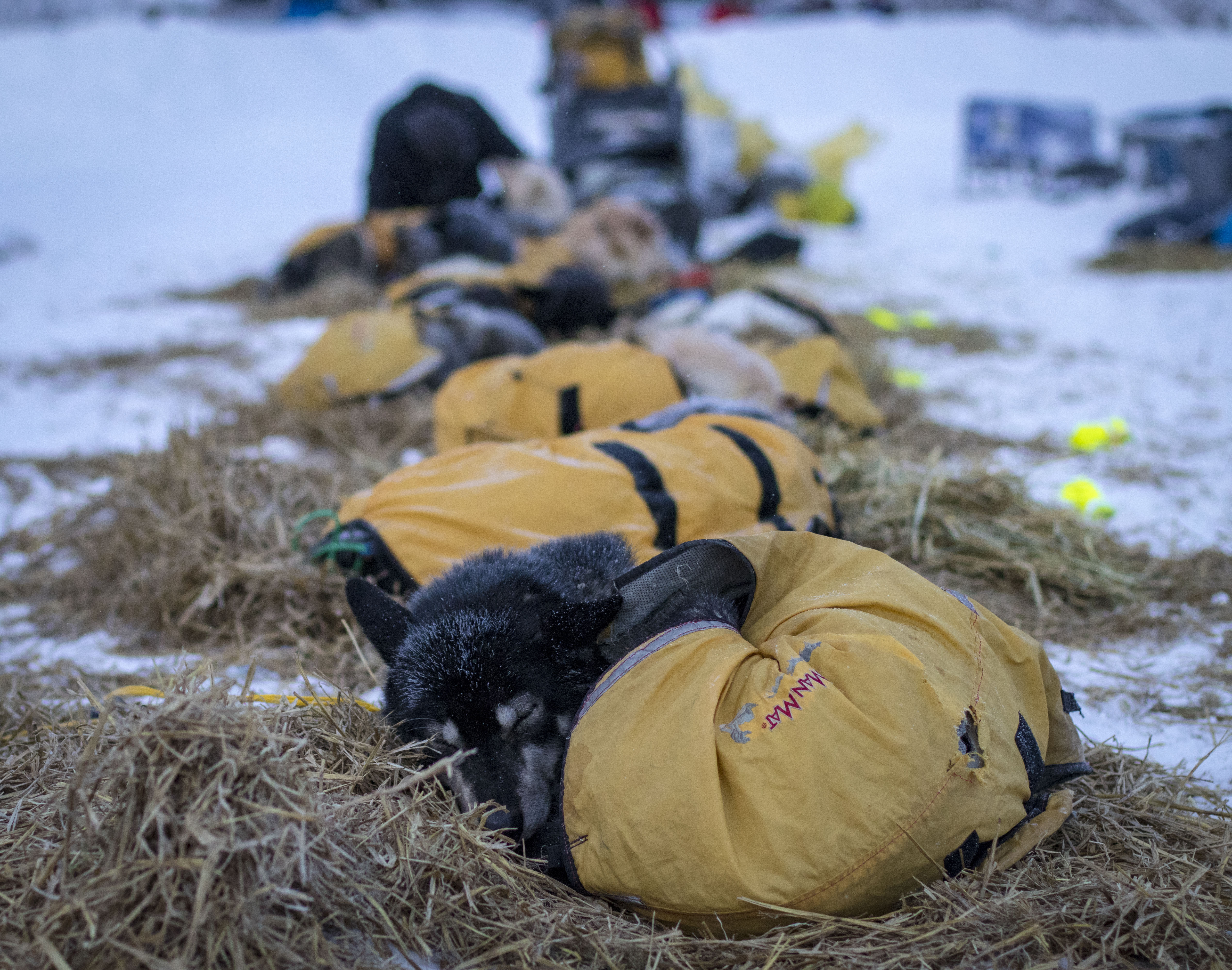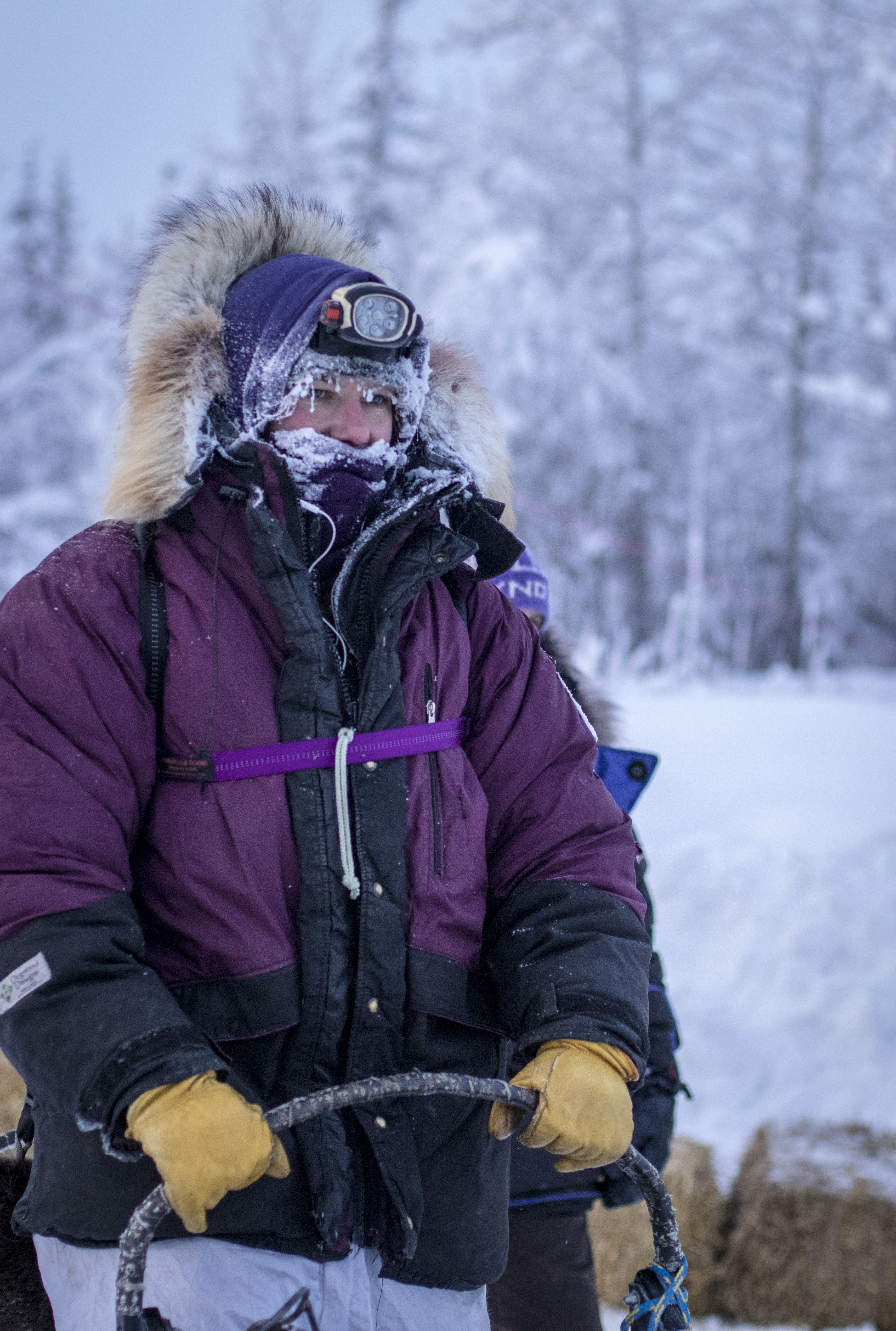Yukon Quest leaders head onto the Yukon River
By Laura Stickells | February 3, 2020

Ryne Olson leaves Circle City and heads out onto the Yukon River Monday afternoon. Olson was the sixth musher to depart the checkpoint. Photo by Laura Stickells.
CIRCLE CITY, ALASKA – The four leaders of the Yukon Quest International Sled Dog Race left Circle City checkpoint within an hour of each other Monday morning, each sticking to a similar strategy for the third day of the race: Don’t try to get ahead, don’t let yourself get too far behind and, most importantly, run your own race.
Michelle Phillips of Tagish, Yukon was the first to emerge from the notoriously winding Birch Creek trail and arrive in Circle, the fourth of nine checkpoints along the 1,000-mile trail to Whitehorse, Yukon. Phillips passed defending Quest champion Brent Sass of Eureka about halfway down the trail and pulled in at 3:45 a.m. Sass reached the checkpoint 44 minutes later.
Sass anticipated that Phillips would pass him.
“I was at my camp place putting booties on kind of hoping she’d go by. And I hooked up and literally pulled the hook and got on the trail and then she came…," he said. “It was apparent that she was going to go by me, one because I was just getting off my break and the dogs were pooping and stretching out and getting going and then overall I know that she has a faster speed."

Sass has an average moving speed of 7.9 mph compared to Phillips’ 8.5, but he’s not too worried about it yet.
“I can’t change that. All I can do is work with the dogs that I have and I feel like they’ll probably get some speed back as we go,” Sass said after handing out some frozen slabs of beef to his team. “A lot can happen within the next 780 miles or whatever we have left. So I’m not really letting it get to me.”
Phillips, who is racing her seventh Quest, is one of four women in this year’s field. The only woman to win the race was Aliy Zirkle in 2000.
Phillips is trying not to think about the possibility of being the second woman to win the Quest.
“You have to think of what you’re doing right now and don’t focus on the finish line,” she said. She sipped a cup of tea mixed with Emergen C inside Circle's Fire Hall, which serves as the official checkpoint. Her throat was feeling a little sore after spending the night on the trail.
Cody Strathe of Cantwell left Central over six hours behind Sass but pulled into Central just three minutes after him. Strathe was the only musher in the top four to rest at Central instead of camping on the trail, which helped him catch Sass and pass Allen Moore, who pulled into Circle almost an hour after him.
“I didn’t come storming in here last night thinking I could catch Brent, so that was a surprise,” Strathe said inside the Circle checkpoint. “I thought maybe I could catch Allen, and I caught him very early so that was a surprise as well.”
Strathe enjoyed two hours of sleep in the closed off musher’s room and followed up the rest with two cups of coffee.
“The last hour I felt like a zombie but now I feel like I can do something,” he said as he was preparing to head back out to the dog yard and bootie his team.
Phillips and Sass were already in the dog yard hooking up their teams and Moore was on his way out. Strathe acknowledged he’d probably be the last of the top four to leave the checkpoint but that he’d be close behind.
“I have to stay within striking distance through Dawson, and by striking distance I have to stay within a couple hours, time-wise. If I let them get beyond that, then it would just be waiting for these guys to make mistakes and these guys don’t make big mistakes.” He also added that if his dogs needed additional rest, that would be the priority.

All four of the top competitors said they weren’t ready to make any big moves yet.
“You can get caught up in the competition and it can add to problems in dog racing,” Sass said. “There’s three or four hundred miles at the end of this race where the real race begins, and I’ll save my competitive spirit for then.”
Sass said he learned to control his competitive side the hard way. In 2016 he made an early push to get ahead in the Iditarod and ultimately had to take extra rest right at the end. He even has “Run your own race” tattooed on his forearm as a constant reminder.
Moore, of Two Rivers, concurred with Sass, saying making a move too early could spell disaster. According to Moore, at this point in the race, the mushers are just feeling out their teams and feeling out each other. But eventually it will be time to make a push.
“Everyone is trying to wait for the right moment, but they don’t really know when that moment is. It’s going on how our dogs look, how their dogs look and sometimes it’s just a feeling,” Moore said. “It’s hard to say when that is until it gets there.”
Phillips left the Circle City checkpoint first, at 10:06 a.m. with 13 dogs. She is the only musher in the top four to have dropped a dog.
Sass headed out 11 minutes later. As his dogs pulled him out of the dog yard and he disappeared into the trees, he yelled “Wild and free, baby!” Moore left at 10:45, followed by Strathe 20 minutes later.
The mushers headed out onto the frozen Yukon River to begin the 160-mile journey to the fifth checkpoint, Eagle, a small community nestled on the Yukon River 5 miles west of the Canada border. Slaven’s Roadhouse lies 60 miles into the trek and serves as a dog drop but not an official checkpoint.
The trailbreakers reported conditions on the river were favorable and the hard-to-navigate jumble ice, which is caused by piled up ice from the river, was minimal.
According to the Yukon Quest live tracker, all four mushers were stopped at Slaven’s at 9 p.m.

Middle of the pack
Torsten Kohnert of Sweden was the next musher to leave Circle City on Monday. He headed toward the Yukon River at 4:10 p.m., over four hours behind fourth place Strathe.
Despite having fallen out of the one- to two-hour window that Strathe had earlier said was “striking distance,” Kohnert was pleased with his young team, particularly two rookies named Ellie and Mummy who have been helping keep the team’s spirits up.
“They’re just happy and eating good and always wanting to go,” Kohnert said. “When we’re leaving and there’s a couple dogs that are making some noise it definitely amps the others up too.”
Kohnert said he was headed off to the mushers room where he planned to get two hours of sleep. He had only slept two hours so far since the race started Saturday morning.
Jason Campeau followed Kohnert into Circle after a frustrating run from Central. His back six dogs got wrapped up in his sled in an accident on the Eagle Summit descent on Sunday afternoon. His leaders also wiped out on the hard-packed ice.
He dropped one dog as a result of the accident at Central. On the run to Circle a couple of the other dogs started to feel the effects from the fall as well.
At around noon on Monday he said he was going to go evaluate his team to see if they could continue. In addition to the health of his team, Campeau is thinking ahead to the Iditarod, which he will be running in March.
As of 9 p.m., he had not left the checkpoint.
Nora Sjalin was the first of the Quest’s three rookies to reach Circle, but she didn’t want to think about the Rookie of the Year Award.
“I’m just going to do my race. If they pass me they pass me. I don’t want to put any pressure on myself.”
Red Lantern
As of 9:30 p.m., rookie Olivia Shank-Neff, listed as Webster on the tracker, was the only musher who had yet to reach Circle. Shank-Neff left the Central checkpoint with 11 dogs at 12:34 p.m. Monday. According to the Quest’s live tracker, she was 38 miles from Circle.
Kyla Boivin, one of the Quest’s five race judges, said that officials might ask Shank-Neff to scratch if she falls behind by over 36 hours of the last musher.
“If everyone is waiting, like all the volunteers, a judge, veterinarians and it’s inconveniencing the rest of the show, it may come into play,” she said.
As of now Boivin says it is not a problem. Shank-Neff checked out of Central just under seven hours behind Dave Dalton, who was the 14th musher to leave.